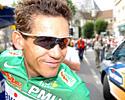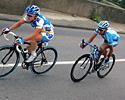Tour de France Cycling News Extra for July 7, 2006Edited by Jeff Jones McEwen considers Freire a threatBy Brecht Decaluwé in Caen
Robbie McEwen finished fifth in the bunch sprint in stage 5, but with already two wins under his belt, he wasn't too unhappy. "It wasn't such a good sprint; it doesn't work out everyday as you like," he said. "You win some, you lose some. You don't win every day in the Tour de France. I've already got two wins, I'll keep trying as I have been. Today didn't work out as planned but there's a few more chances to come." The Australian sprinter described what went wrong today: "We tried the same tactic as yesterday but my lead-out Steegmans mistook the sign for 500 with the one of 200 metres to go. He went with everything just a bit too early today. "That left me in the front with 300 metres to go into a headwind. I didn't want to lead out the sprint for the others, then die and end as tenth. I waited and tried to get back in the wheels and go again." That resulted in a place that was just enough to stay in the green jersey by one point from Tom Boonen. And Oscar Freire is only seven points away from McEwen. "You've got to consider everybody. He's [Freire] scored points pretty much every day and he's capable of scoring points in some really hard stages," said McEwen about Freire. "There's one stage in particular in the mountains where he'll probably survive in the bunch, or what's left of it, and he can take lots of points. You certainly have to consider him, as the guy isn't triple world champion for nothing." Little Sam's big day outBy Brecht Decaluwé in Caen
One of smallest riders in the peloton, Samuel Dumoulin (AG2R), loves the challenge. As he isn't fast enough to beat the big guys in a bunch sprint, he choose a different strategy yesterday: getting into a break. He was already in an escape of eight, but the presence of Bram Tankink condemned the breakaway. Dumoulin didn't give in and tried again just as the group was brought back by the bunch. He was joined by Bjrörn Schröder for a long trip of 205 kilometres in the front, but their adventure ended two kilometres from the finish. "This is a great moment for me today," he said proudly. "I'm riding around in my own region until Sunday. Once we were away, I was driven by the encouragements of the crowd. I went flat-out to get as much publicity as possible, for my sponsor and family, because they brought me where I am now. This day brought me nothing but happiness." Does this mean that he didn't believe that the breakaway could make it to the finish? "No, we knew it would be difficult, and when we saw the advantage was dropping, we knew it was all for nothing. We know the script and so we got beaten, but there's nothing else we could do," the French rider explained. Being with only one other rider for most of the day makes it important to get along: "We understood each other really well. We've been talking and supporting each other all day long. He was stronger in the final, but alright, he also went flat out. He was a good teammate for the day, " Dumoulin concluded. Schleck, Vansummeren and others crashThree and a half kilometres before the end of stage 5, Isaac Galvez touched the wheel in front of him and brought down several riders, including Daniele Bennati, Franck Schleck and Johan Vansummeren. The latter told Sportwereld.be that he got out of it relatively unharmed. "I tried to avoid the crash," he said. "Just when I stopped, Schleck ran into me from behind. I fell over, smack on top of the Luxembourger." It wasn't so bad for Vansummeren, but Schleck came off worse - not because of injury, but because he ended up losing 2'07. The crash happened just before the "safety zone" at 3 km to go, and the CSC rider therefore didn't get bunch time. Schleck's teammate Stuart O'Grady wrote about the stage finale in his diary. "Things were looking bright. It was pretty fast and I was keeping Sastre out of trouble and up the front. The boys were really moving as we were pulling back the break. About eight ks from the finish we came into this roundabout and I punctured. We were doing warp speed and the tyre rolled off the rim. I felt like Mick Doohan as the bike kicked sideways and I had to ride it like a bucking bronco. Maybe that number 13 is not so bad as I was lucky to hold it upright. "After that I was just coming back onto the back of the convoy when I came across another crash and my team-mate Frank Schleck crashed, so I waited for him and tried to help him out."
Gerolsteiner updateGerolsteiner had its share of problems yesterday, starting with a bus that wouldn't start. The battery "went on strike", as Fabian Wegmann put it. And where do cyclists change their clothes when there is no bus or dressing room around? Well, right there, wherever they are. "So we had to change clothes right there on the street. That surprised some of the fans looking on!", he wrote at www.fabianwegmann.de. "Most of the other riders didn't make fun of us - they've probably all been in that situation before, too." The bus was working again by the end of the race, but Peter Wrolich may have had a problem sitting down in it. He got caught in the crash 3.5 km before the finish line. As he described it, "Isaac Galvez hit Boonen's rear tire and took me and Bennati with him. I had no chance to avoid the crash. Fortunately I suffered nothing but scrapes and bruises." What he doesn't say is where he received those wounds - but you can always depend on a teammate to expose your most intimate secrets: "He got some really incredible scrapes, on his most honourable part: his bottom," said Wegmann, who also notes that the Austrian was able to joke about it on his way back to the hotel after the stage. Fisticuffs over mountain points?The duel over winning the polka-dot jersey for the best mountain climber may be more intense than expected. That the riders fight it out on their bikes is normal, but they don't usually literally fight it out while on their bikes. According to CSC's Jens Voigt, that's exactly what happened yesterday. The two who got it on yesterday without boxing gloves were Walter Beneteau of Bouygues Telecom, whose teammate Jêrome Pineau is leading the mountains classification and Saunier Duval's David de la Fuente, who is second in the rankings. The two mixed it up previously, being fined for "irregular behaviour" on Wednesday. Writing on www.sports1.de, Voigt described the scene this way: "Today the two were riding next to each other and all of a sudden, the Spaniard hits Beneteau full in the face! It was really loud, just like in a boxing match! Beneteau's helmet and glasses practically flew off his head! He swerved, because of course he hadn't been expecting anything like that." "Behind them everyone was shouting, 'Hey, are you crazy? If you're going to fight, go to the side of the road! Leave us out of your problems!' Beneteau didn't blink an eye but went directly to the commissaire. I think, that they will throw de la Fuente out of the race." Sacchi outFabio Sacchi (Milram) will not start today's stage six in Lisieux. The Italian has been suffering from bad bronchitis in the last few days, and has had difficulty breathing according to his team. Sacchi made the decision to pull out in agreement with team doctor Claudio Sprenger and directeurs sportifs Claudio Algeri and Jan Schaffrath. Jaksche's doctor: drug use commonGerman doctor Kurt Moosburger, who has looked after Jörg Jaksche (among others) for the past two years, has told dpa that he believes that performance enhancing drugs are "indispensable" for high level cycling In a frank interview, Moosburger pointed to the average speeds of modern professional races, especially hard tours. "The average in last year's Tour was 41 kilometres per hour - that is incredible. You can do a hard Alpine stage without doping. But after that, the muscles are exhausted. You need - depending on your training conditions - up to three days in order to regenerate." To help recover, testosterone and human growth hormone can be used. "Both are made by the body and are therefore natural substances," he said. "They help to build muscle as well as in muscle recovery." Dr Moosburger explained how it was done. "You put a standard testosterone patch that is used for male hormone replacement therapy on your scrotum and leave it there for about six hours. The small dose is not sufficient to produce a positive urine result in the doping test, but the body actually recovers faster." Dr Moosburger went onto explain that, "The supply of oxygen to the blood decides what the body is capable of in terms of fat- and carbohydrate metabolism. This capacity is mostly genetically determined.The muscles of athletes who are able to reach the top level of sport can carry about 60 millilitres per kilo per minute in an untrained condition. That of an average person is only about 40 millilitres per kilo. In order to be able to keep up with the world's best, it must be 85 to 90 millilitres. EPO helps oxygen carrying capacity, and has long been the performance enhancing drug of choice in endurance sports. "It enables you to hold the haematocrit of the blood in the upper level of what's allowed for the whole season. Before the EPO test, for example, athletes injected 4000 units three times per week. Now they inject a small dose almost daily." Finally, in the opinion of Dr Moosburger, blood doping via transfusion would give an athlete a five percent boost for two to three weeks. "And therefore can last for a grand tour." (All rights reserved/Copyright Knapp Communications Pty Limited 2006) |

|
January 2009 |
Recently on Cyclingnews.com |


